Best Optrel Welding Helmet: Top 6 Picks for Quality & Safety
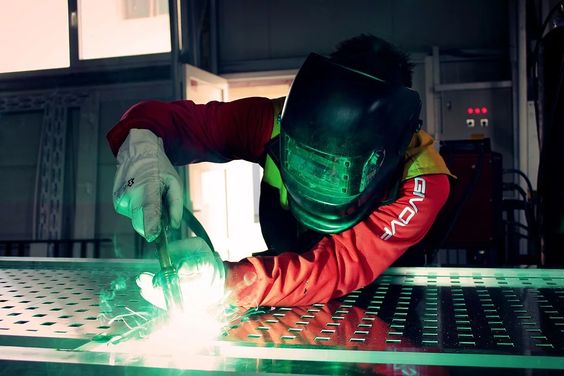
Many people are interested in Optrel welding helmet reviews. This is due to the fact that the company is known for producing some high-quality models. And people need to stay protected while welding.
It’s obvious that welding is a dangerous job. Numerous unwanted accidents can occur while doing it. Starting from flashes and too strong rays to debris, your eyes and face may suffer. Therefore, in order to keep their health, welders constantly search for the right helmets for them. Ideally, they should cover their whole face and neck. Also, they should be within the budget of the buyers.
Sometimes, this can be tough to accomplish. That’s why we compiled this complete guide to choose the best optrel welding helmet. So, enjoy!
Reviews of the 6 Best Optrel Welding Helmet Models
You shouldn’t start or continue your welding work without the proper gear on your head. Nowadays, one of the top companies that produce welding helmets is Optrel. It’s true that some of its models attain higher prices. However, considering the premium features, it’s worth it.
Why are people so fond of Optrel? For starters, the helmets are suitable for various types of welding. Among these are the stick, TIG, and MIG welding. Each of them has certain dangers that can be overcome thanks to the protective headgear. Mainly, accidents may happen during the actual connecting of materials. All sorts of debris may fall out and fly into your face. Aside from that, the UV, IR flashes and the likes are very dangerous for your eyes.
In its helmets, Optrel made sure to include safety details and useful features. So, to help you pick the helmet for you, here we gathered the top model. In the following sentences, you’ll discover what makes these helmets special, some pros and cons they have as well as specifications.
1. Optrel Panoramaxx Welding Helmet
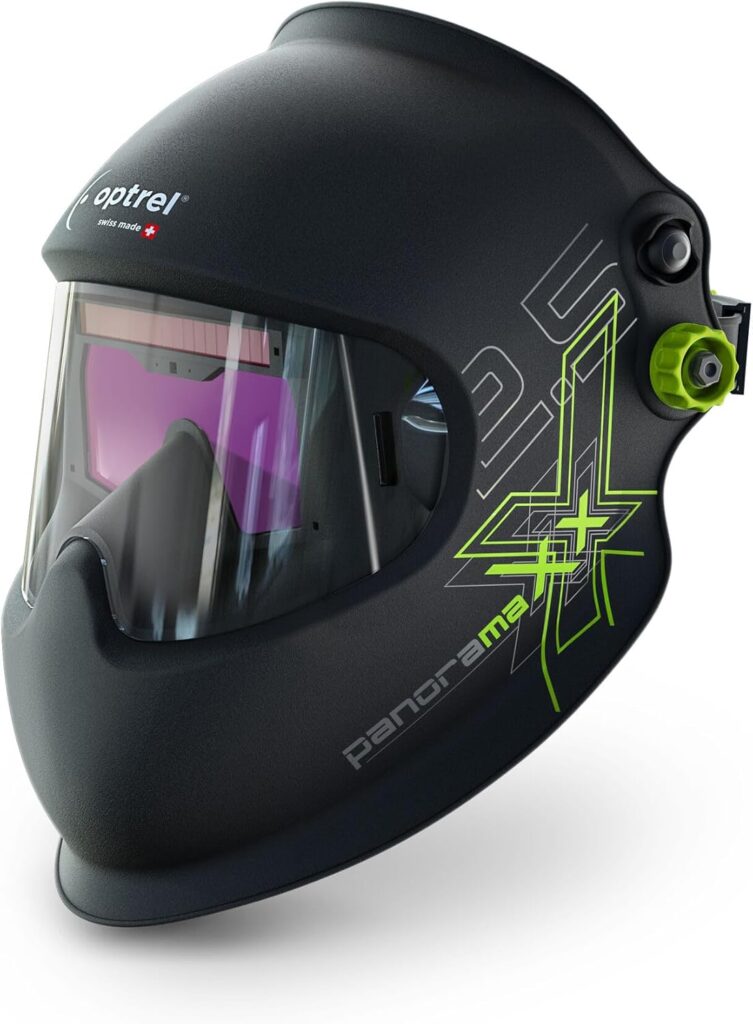
Firstly, we’ll mention the Optrel Panoramaxx Automatic Welding Helmet. As a model, it’s made to give a priority to the picture. Moreover, Optrel made it with a wide viewing area. Actually, it’s six times bigger than the regular models. And the lenses are very close to the welder’s face, allowing them to see better. They darken automatically from 5 to 12 shades. Also, the colors they show are close to the real ones. The specifically-designed UV/IR filter is responsible for the realistic colors.
What comes in handy are the charging options. Moreover, you can charge it either through the micro USB port or the arc light. There is no need to purchase batteries. It works fine with rechargeable ones. Another useful detail is its lightweight. This makes it comfortable to wear for a longer time. Not to mention that it doesn’t cause strain nor pain. The material used for this helmet is plastic and it comes in black color. Welders that prefer simple-looking helmets will like this.
As a downside, users state the small variety of shades. However, this is compensated with the size of the viewing area.
Some more specifications and features are as follow:
- Weight: 3 pounds
- Lithium batteries needed
- Dimensions: 11x10x12.7 inches
- Size of screen: 5×2 inches
- Extra replacement lenses
2. Optrel e680 Welding Helmet
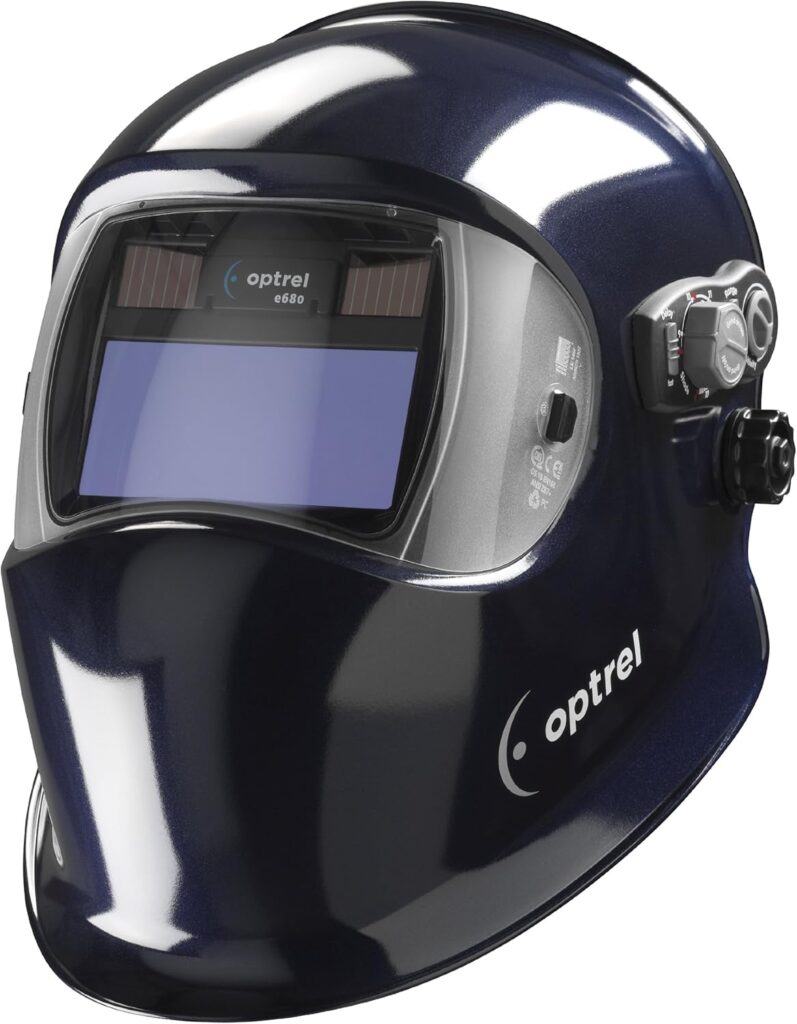
This is a premium model. It outshines the helmets in its league in various aspects. That’s why it can be utilized for many different jobs. They range from TIG and MIG to Stick welding tasks and others.
What users find really helpful is the remote adjustment. Moreover, you don’t need to take the helmet off in order to adjust it. Since all the buttons are on the outside you can do it manually or with the remote control. Among the adjustable features are the sensitivity slider, grinding mode, and time delay. Also, it’s considered to be comfortable. So, you can have it on for a longer time without feeling pain.
When it comes to the view, this helmet presents true colors. This is done thanks to the wide display that offers a bright image. And it incorporates many details so that welders know exactly what they are working on. Usually, the puddle and controls of the machine are clearly visible. Obviously, the security of the welder comes in the first place. That’s why the hood is made to resist damages. It completely covers your face, keeping UV and IR rays, light, debris, sound, and sparks away. What’s more, the lenses darken automatically. They go between five and thirteen shades.
Understandably, these premium features come at a higher price. The e680 model reaches $600. For many, this is the main downside.
More precisely, other details and specifications about this helmet are:
- Adjustable headgear that goes three ways
- Grinding mode
- Weight: 0.16 ounces
- Functions for sensitivity and delay
- Outside controls
- Window dimensions: 4×2 inches
3. Optrel VegaView 2.5 Welding Helmet
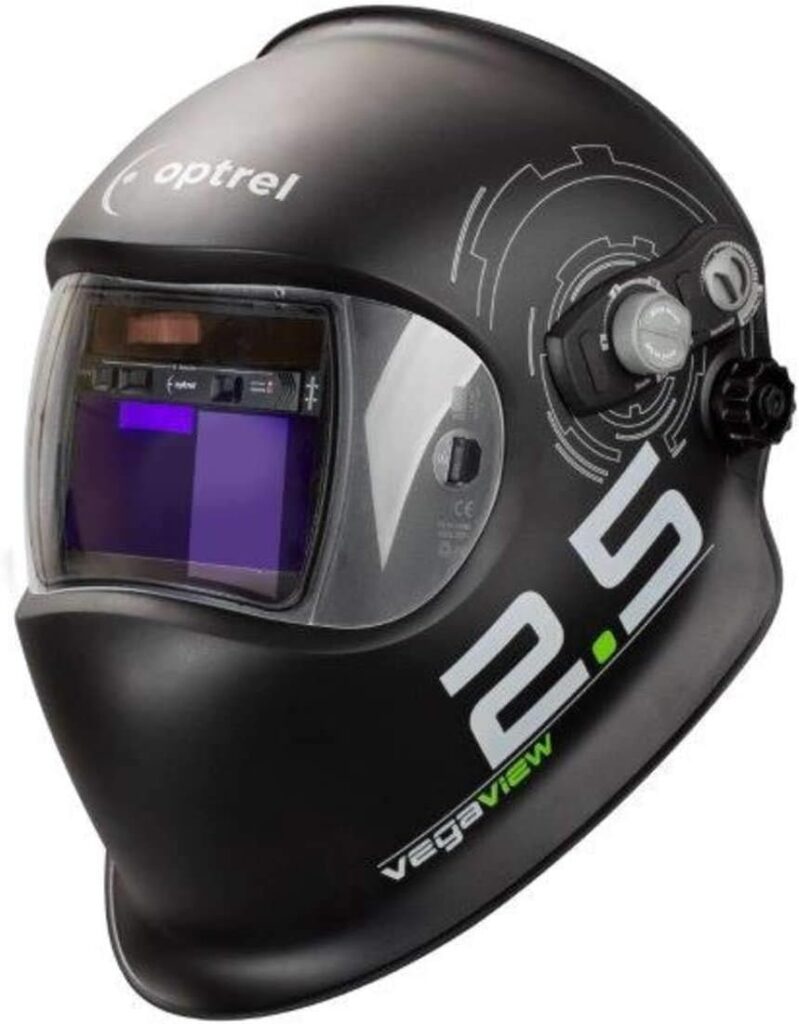
Comfortability is a vital feature. And this model is made to be very easy to wear all the time. Especially during longer welding tasks, this comes in very handy. Not to mention that it’s portable and can be brought everywhere you go. Those that want to wear something nice-looking over their head will find great pleasure in the artistic design. The black color makes it minimalistic, as well.
Despite this, Optrel produced this helmet to offer maximum protection. Moreover, it unites all the details needed for keeping people safe from all dangers. Most importantly, it completely covers your neck and eyes while you are welding. Its wide viewing area contributes to the detailed image you get. Actually, in the light, the view extends to 180 degrees. This allows the welder to see what’s happening in their surroundings. And it’s better than many more expensive models on the market. To accompany this, there are true color shades that are auto-darkening. After you adjust them externally, they go from 8 to 12. Because of this, VegaView represents one of the best models of the company. The 9-point halo headgear and the pad that absorbs sweat are additional details you get with this helmet.
When it comes to cons, people say that the outer lenses are curved. Sometimes, they put off glare and that can be a bit confusing.
Other specifications and features to consider are:
- Weight: 2 pounds
- Delay function
- Classification: 1/1/1/1
- Grinding and overhead usage
- Shade level: 8-12
- Dimensions: 14x14x10 inches
4. Optrel e650 Welding Helmet
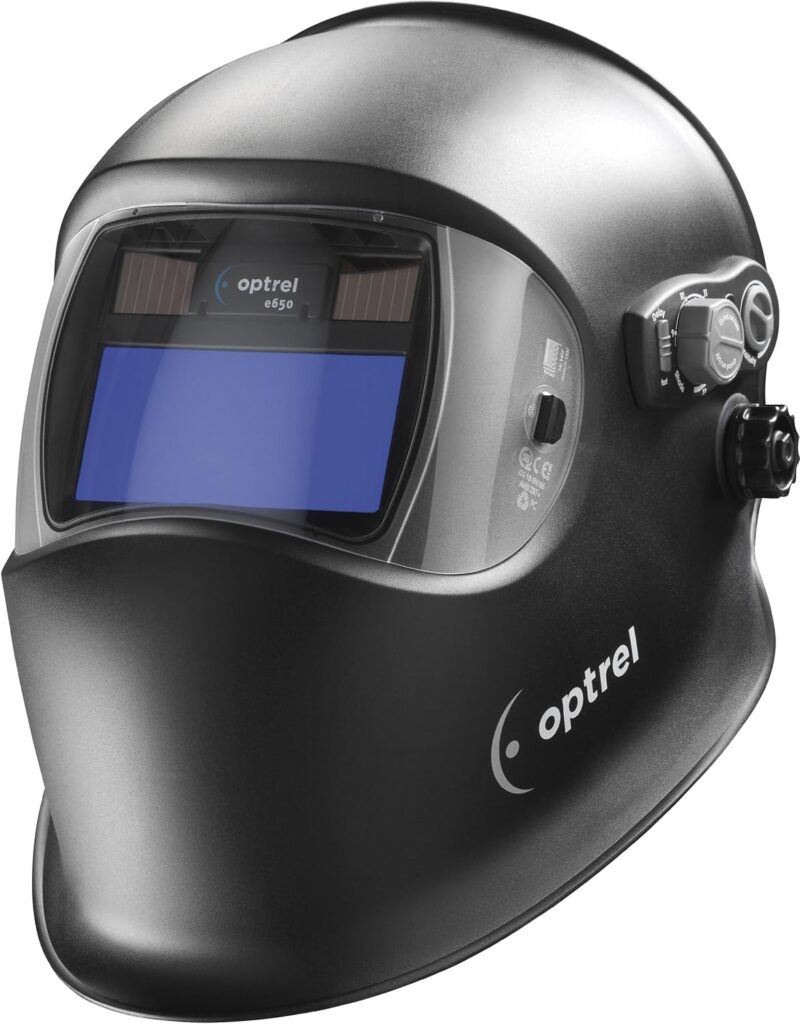
This isn’t a very costly helmet. Yet it has some notable features. Firstly, it’s worth mentioning that it’s an auto-darkening welding helmet. It adjusts the view by itself, protecting you from possible hazards. When compared to some other models, though, its lenses range from nine to thirteen shades. It comes with protective covers for the lenses.
Even though it doesn’t show the image in true colors, it has a wide viewing area. It’s 4 by 2 inches. Connected to this, it has a fast response time of 1/10.000 of a second. The automatic adjustment happens thanks to the two arc sensors for detecting light. And the side knob on the outside helps welders adjust the settings.
Many welding tasks take a longer time to complete. That’s why Optrel produced this helmet as a long-lasting one. Furthermore, it operates both on batteries and solar power. If you keep it in the dark, the battery can last for as long as 2.500 hours. This is a lot in the welding world. To add extra security, there is a grinding mode, too.
Optrel assures buyers of the quality of this helmet with the three-year warranty. During this time, you can be sure that if by any chance something happens to the helmet, you’ll be able to get it fixed.
As with everything, there are some downsides to be mentioned. They revolve around the lack of remote control and short lens range.
Some more details and features are here:
- Color: Black
- Weight: 2 pounds
- ADF controls
- Width of the plate: 4-1/3 inches
- Classification: 1/1/1
- Size of the viewing area: 4×2 inches
5. Optrel E684 Welding Helmet

As a mid-priced model, the e684 welding helmet incorporates many features from the afore-mentioned helmets. For starters, its viewing area stretches 4 by 2 inches. It provides high-definition views. The technology about true colors contributes to this. Thanks to it, welders can observe their work and surroundings easier. Related to this, there is the so-called Twilight feature. It enables you to lighten the lenses slowly when you go from dark to light. This is done to reduce the pain and fatigue in the eyes.
As for the power, its battery life is 3.000 hours. And it works exclusively on lithium batteries. Understandably, the helmet has auto-darkening lenses with a rating of 1/1/1/1. Instead of two, it has three sensors for detecting arcs. They are enriched with the five to thirteen shades range. In case you prefer to adjust the shades yourself, you can choose manually from four to thirteen lens shades.
With the external knobs, welders can be in charge of the delay and sensitivity. Not to forget, they can switch between grinding and welding mode. This increases the safety even further. The fact that this is a model made out of metal says enough about its durability. The company made a compelling design to go with it. The color it used was silver with green graphics over it.
If we have to point out some downsides, we would say the power limitations. Sometimes users find it hard to get the right ones. Aside from this, it lacks an electromagnetic sensor.
More specifications and details:
- Weight: 2.1 pounds
- Dimensions: 10.2×9.1×10.6 inches
- ADF controls
- Grinding mode
- Standards CSA Z94.3’
6. Optrel Crystal 2.0 Welding Helmet
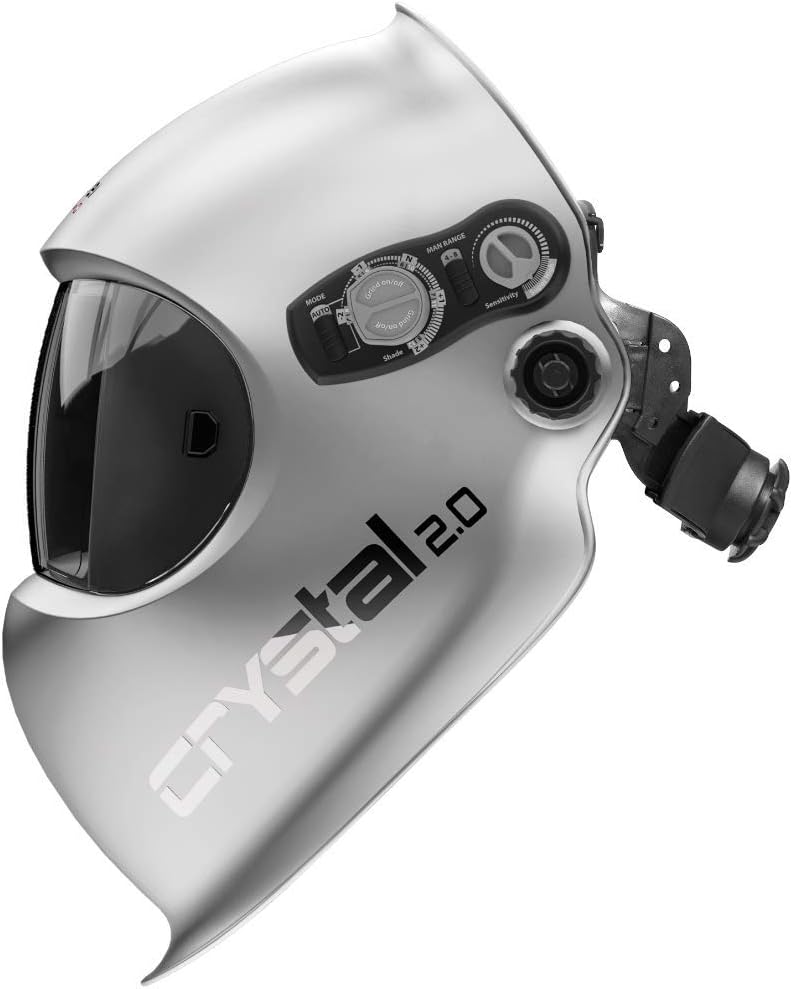
It’s nice to see powerful helmets on the market. Optrel’s Crystal 2.0 is such a helmet. It justifies its name with its lens technology with light two shade. This is better than the usual light shade of three and four. And it gives the welders a chance to observe the scene during and after the welding. Combined with the clarity of the lenses, the view is one of the clearest you can get at the price of around $400.
When the light changes into darker surroundings, the automated adjustment activates. The autopilot helps the helmet detect brightness arcs faster. Also, the shade levels adjust from 4 to 12. To prevent pain in the eyes, Optrel incorporated the Twilight feature. It’s responsible for lightening the lenses gradually. Another feature in this regard is the sensitivity adjustment. This is great for welding outdoors in the sun. Without removing the helmet, welders can choose between the grinding and welding mode.
However, everything isn’t absolutely positive. Some downsides users point out are the loosening of the tighteners and the three sensors, which aren’t sufficient enough. Therefore, while stick welding, they may flash you.
Read on for additional specifications and features:
- Dimensions: 11×10.8×9.2 inches
- Weight: 2.24 pounds
- Color: Silver
- 2 lithium ion batteries needed
- True color technology
- Shades adjustment between 4 and 12
What to Consider Before Purchasing Optrel Welding Helmet – Buying Guide
Sensors
When it comes to detecting the flashing and thus protecting yourself further, sensors play a vital role. More importantly, the number of sensors is what differs some welding helmets from the rest.
The most common number you’ll find on the market is four or two. As you may expect, the more expensive models have four arc sensors whereas the cheaper models have just two.
It’s safe to say that helmets with two sensors perform all right, too. If your welding task is simpler, a two-sensor helmet will do the job just fine, saving you a couple of bucks along the way. In some cases, they may not catch all the flashes. On the other hand, having four sensors translates into full safety.
Fit
The helmet fit is another category to consider further. It’s important to see how the particular helmet you think of buying fits your head.
The welder’s whole face should be covered including the upper part, the ears, neck, and similar. That’s because welding can be a dangerous job that can damage the skin. Moreover, the skin can be burned from ultraviolet rays or sparks and such. Helmets that are made to mimic the human’s head may be a solution.
Also, you can consider a welding bib. To increase the protection and if the job, itself, demands it, a helmet with a hardhat adaptor sounds like a great idea.
Viewing Capabilities
How much you’ll be able to view with your helmet is on is basically up to your personal needs and taste. Furthermore, another factor is the number of out-of-position welding tasks you’ll be performing.
Often, welders, who like to do it for fun, look for welding helmets with view sizes from six square inches. The situation is a bit different for the proficient, industrial welders. A size of nine square inches may suit them better instead.
Period of Adjustment of the Lens
This is relevant for the helmets that have a variable shading system. That means that the lens gets darker depending on the light emitted from the welding job.
Naturally, the shading or the adjustment should commence momentarily or at least as soon as possible. If that doesn’t happen, the eyes may be hurt and exposed to radiation. Even a short delay may have consequences. There’s a health condition called an arc eye that’s associated with this. Having said that, continuous unguarded exposure may result in even blindness.
So, it’s easy to see why a short adjustment period is a must. Typically, more quality helmets have a period of less than 1/10,000 of a second. 1/3,600 second is deemed to be the minimum you should look for when shopping for helmets.
Power Source
Helmets get the power from solar energy or batteries. Or both. The solar option costs less in the long run. It’s because you don’t have to buy batteries which is what you should do if you go with battery-powered helmet.
On the other hand, solar helmets need a little longer to charge. The helmet with batteries can be used immediately without bothering yourself with that. Newer models come with a combined power – both solar and battery power. These so-called hybrid welding helmets remove the drawbacks of the two power systems. And it takes the best from both.
Which is the Best Optrel Welding Helmet for Your Needs?
After going through all of this, it’s understandable why Optrel is a trust-worthy brand among welders. The helmets it produces aren’t only well-designed, but they have some helpful features, as well. Some of the ones standing out are the variety of lens shades, auto-darkening lenses, and the wide viewing areas.
Because of these, welders can do their job while seeing what they are working on clearly and keeping all dangers at bay. Of course, there are advantages and disadvantages. But the key is to make compromises. Decide where your priorities lie and choose your Optrel welding helmet in accordance with that.
So, what did you decide? Is Optrel a company for you? Share your thoughts and experiences with us here. We would love to learn more about these helmets from you.
